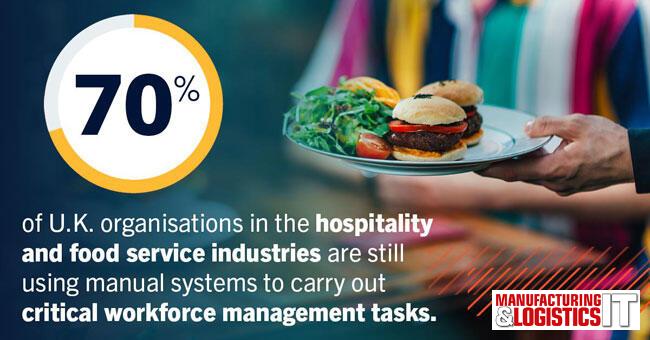As many as 7 in 10 UK organisations in the hospitality and food service industries are still using manual systems – such as paper-based processes, homegrown spreadsheets, or both – to carry out critical workforce management tasks.

According to a recent survey conducted by Kronos Incorporated and The Caterer, managers and employees yearn for modern workforce management technology to ease administrative burden, help them work more efficiently, and boost employee engagement and performance.
These findings are covered in the final instalment in a two-part research series (view part one) of nearly 400 UK-based workers in the hospitality and food service industries, including workers at hotels, bars, restaurants, and leisure services. Managers and individual contributors (i.e. ‘employees) paid either hourly or salaried were surveyed to gain an understanding of the biggest challenges they face from a workforce management perspective.
Manual processes are ‘watering down’ the moments that matter for managers and employees. The survey revealed that many organisations still use spreadsheets – and in some cases, old-fashioned pen and paper – to tackle integral workforce management activities that have a direct impact on employee productivity and engagement, leaving scheduling accuracy and fairness to chance.
A drastic number of hotels and restaurants say they do not leverage technology to help employees do the following tasks: swap shifts (71%); scheduling and rostering (69%); time off and holiday requests (62%); HR tasks such as recruitment, onboarding, and talent management (60%); customer demand forecasting (54%); and capturing time worked (50%).
Managers are hungry for modern workforce management technology. When managers were asked what would have the greatest positive impact on their personal performance and/or that of the wider business, the top request is for technology to accurately forecast customer demand (38%), which reflects the struggle of the 58% who say they are often overstaffed during a quiet period, and 40% who say understaffing during peak times happens on a regular basis.
Proactive alerts that automatically flag potential non-compliance (such as employment rules and exceeding budgets) came in second at 34%. One-quarter of managers (25%) expressed a desire for their employees to have self-service technology to reduce the number of HR-related queries they get in their role. Finally, managers yearn for automated workforce scheduling processes (22%), access to real-time workforce analytics and reports (22%), and the ability to do these things on a mobile device or tablet (22%).
Technology has great potential to empower employees. When it comes to improving their own performance over the next 1-2 years, employees want more training (29%), even more self-service tools that empower them to manage their work without manager or supervisor involvement (24%), greater flexibility (14%), and improved payroll accuracy (10%). This underscores the potential for automation and innovative workforce technology to positively impact processes and productivity in a way that benefits all employees while easing managerial administrative burden, freeing leaders up to focus on responsibilities that add value.
Neil Pickering, industry and customer insights manager, EMEA, Kronos, said: “The data is clear: manual, antiquated, and time-consuming processes are relied on for crucial elements of workforce management in the U.K. hospitality and food service industries. Improvements are needed to ensure that managers and employees are able to go about their jobs as efficiently as possible, and that means putting the right technology in place to work alongside top talent.
Workforce management technologies have been embraced to a certain extent, but taking the next step on this journey requires organisations to evaluate their current processes and listen to the needs of the modern workforce – managers and employees alike. At Kronos we believe that great businesses are powered by great people, and those great people are your most important asset, so their welfare should be considered when evaluating critical tools for organisational success.”

Add a Comment
No messages on this article yet